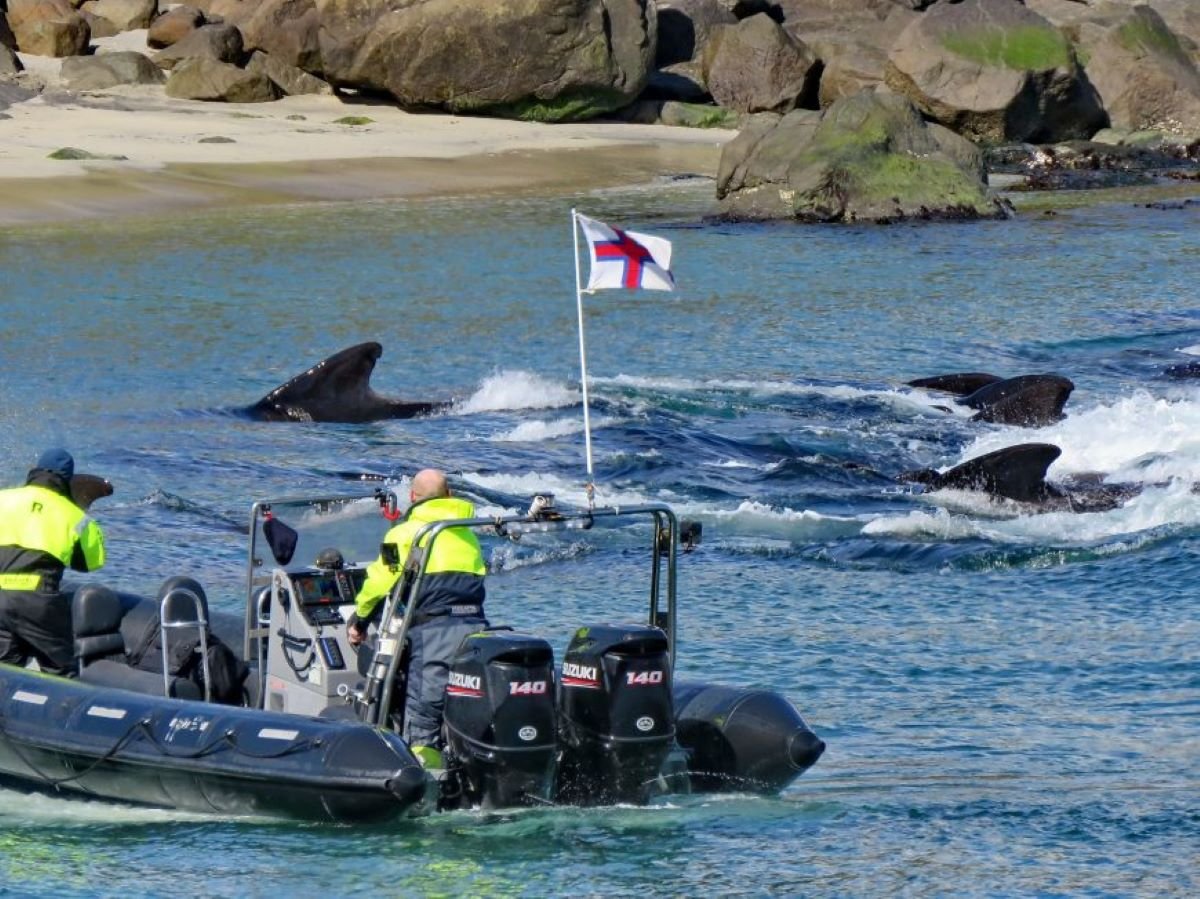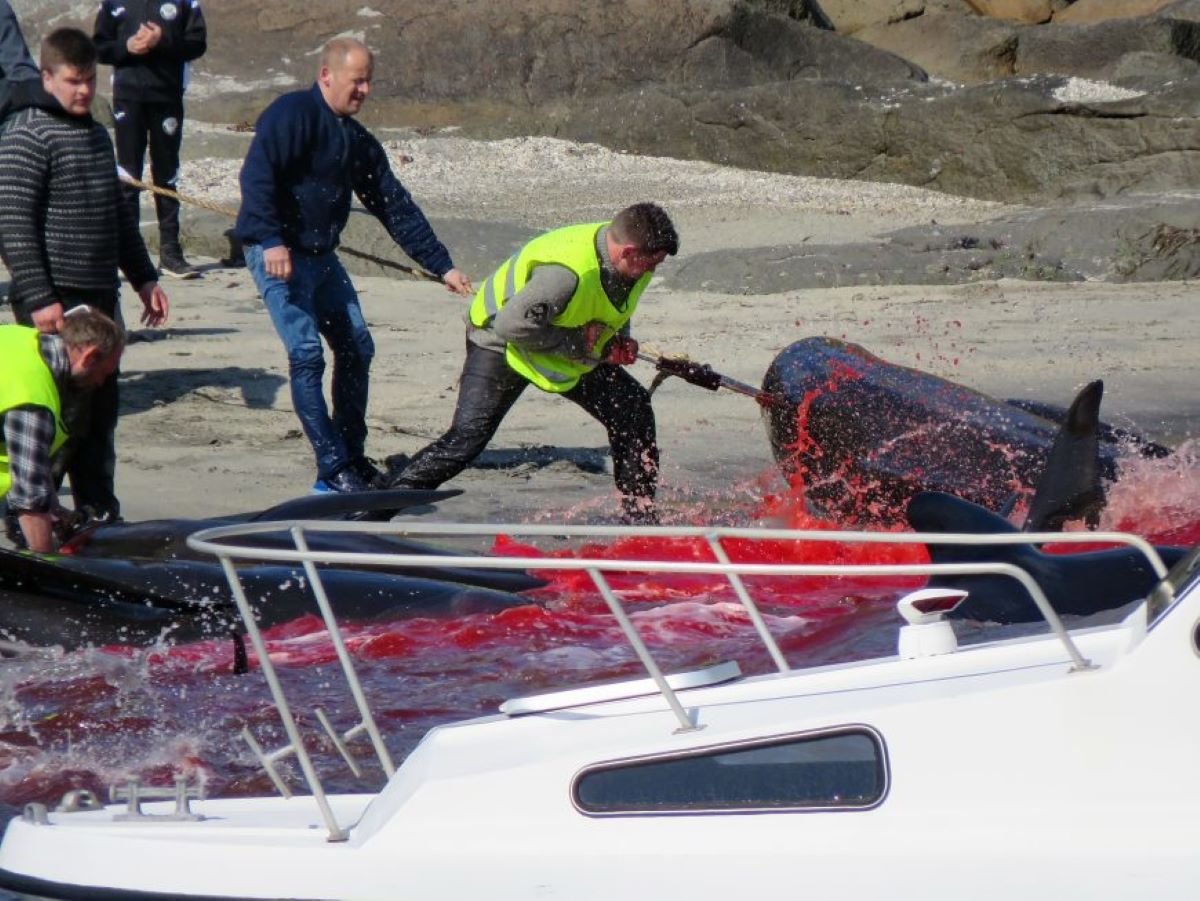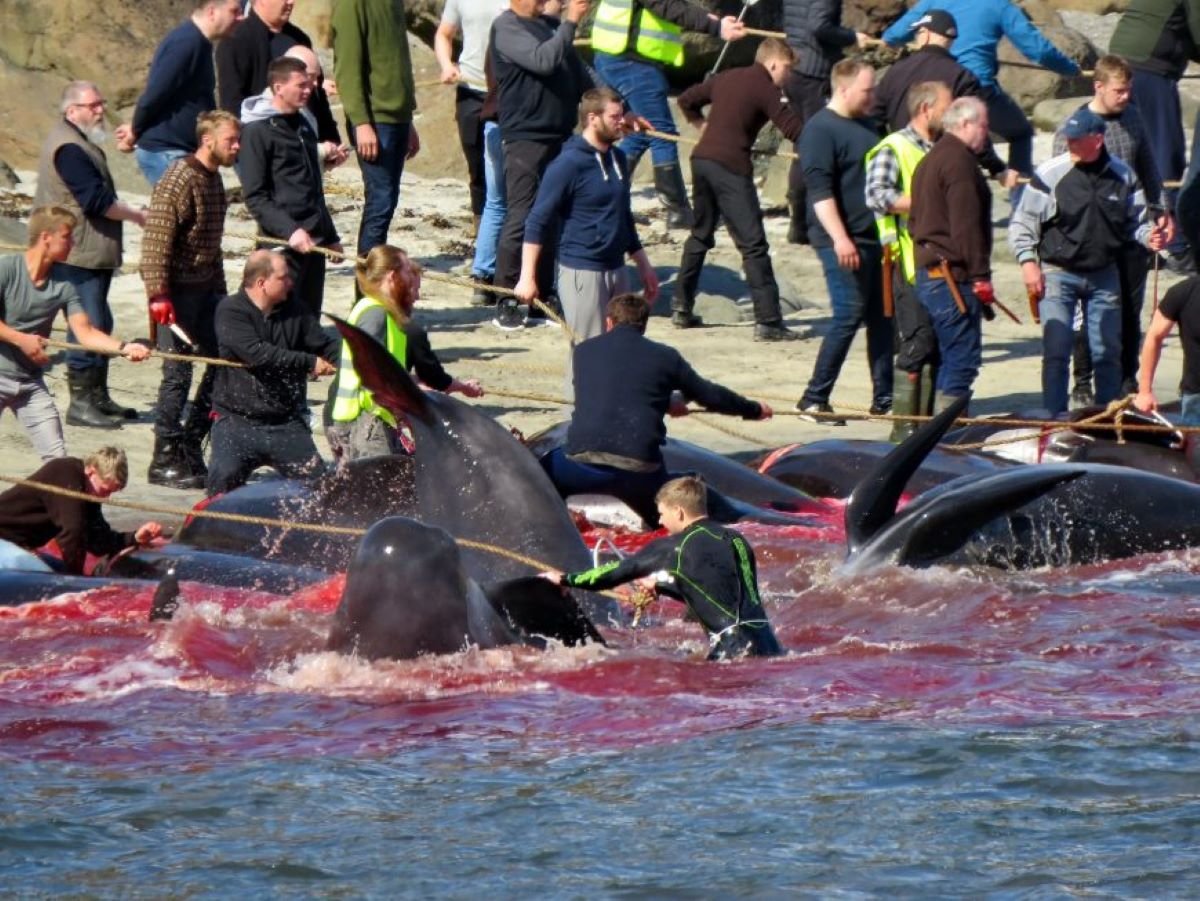Over 60 pilot whales have been butchered alive in the Faroe Islands' first whale slaughter of the season.
The whaling season in the Faroe Islands begins in the summer months and is a tradition that dates back around 1,200 years. Pilot whales are killed each year for their blubber and meat. However, not all Faroese people approve of the hunt.
Photographs captured by local citizen and underwater photographer, Ingi Sørensen, show the first hunt of the season taking place on May 7. While some Faroese people remain adamant that the practice should remain as a homage to traditional Faroese culture, Sørensen openly condemns the hunt, and is not alone.
In his photographs, beached pilot whales can be seen being dragged to shore with ropes and spears. The photographs also appear to show the pilot whales thrashing about in bloody water.

Pilot whales are a type of dolphin, commonly found in the North Atlantic. There is an estimated 778,000 pilot whales in this area. The hunt has previously been deemed sustainable as there is an abundance of them in these waters.
Usually around 800 pilot whales are hunted every year. A hunt last year, which saw 1,500 dolphins slaughtered, sparked outrage and initiated efforts from the Faroese government to review the hunting policies.
"It can happen four times a year and it can happen 10 times a year, you never know," Sørensen told Newsweek. "I feel sad when it happens. Very sorry for the whales and very sad for the lack of feelings and empathy for the whales in our people. It doesn't look like it will ever stop. But most people here believe that it will stop some day .... I know it sounds strange, but that is how it is. Only some of us want it to stop right away."
According to a blog, written by Helene O'Barry, European campaign correspondent at the Dolphin Project, once the pilot whales are stranded they are subjected to "complete chaos, commotion, and yelling as hunters start the practice of dragging them ashore."

Hunters do this by stabbing stainless steel hooks into the whale's blowhole. This hook is also attached to a piece of rope, which hunters use to drag the whale ashore.
When Sørensen took the photographs, he said he saw "lots and lots of people and cars looking at the killing without any feeling what so ever."
"They are so used to it, they don't feel anything, it is entertainment," he said. "One of the problems is, that people love the meat and blubber."
Pilot whales, which weigh over 5,000 pounds each, are killed by a spinal lance, which is jabbed into its spinal canal.
The Faroese government has previously acknowledged that the hunt is a "dramatic and bloody sight" by "its very nature."
However, it has also previously insisted that this traditional hunting method is more humane than harpooning or spearing.

Since the 20th century, animal welfare groups have campaigned for the pilot whale hunts to come to an end. The hunts have been deemed unnecessary and inhumane now that the Faroese people do not solely rely on whale meat for sustenance, as they did a long time ago during times where food was scarce.
O'Barry told Newsweek that several organizations are working to stop the pilot whale slaughter, "each with its own approach."
"Having been to the Faroe Islands twice, I have become convinced that the slaughter will stop, but it will most likely be stopped by the Faroese people..." she said. "The Faroese pilot whale slaughter has been going on for hundreds of years and has become part of their way of life. Unfortunately, not even the dangers linked to consumption have stopped the hunts."
The meat on pilot whales has been confirmed as toxic, with high mercury levels which can cause health issues.
O'Barry said that others who oppose the hunt, such as Sørensen, are "sadly a minority."
"Most of them tell me that it's very difficult to openly criticize the hunt, as they risk being called traitors," she said. "The negative stereotyping that portrays all Faroese people as whale hunters is far from the truth... it is impossible to predict when the next hunt will take place. Most hunts, however, take place during the summer months, as this is when most pilot whale sightings occur."
Newsweek has contacted the Faroese government for a comment.
O'Barry said she has reached out to the Danish government herself to ask them to speak out against the hunt.
"The government recognizes the importance of the Faroe Islands to be able to utilize the ocean´s living resources in a sustainable way, including pilot whales," a government spokesperson told her in response.
Update 6/20/22 11:02 a.m. ET: This article has been updated to say that Helene O'Barry reached out to the Danish government for comment.
Uncommon Knowledge
Newsweek is committed to challenging conventional wisdom and finding connections in the search for common ground.
Newsweek is committed to challenging conventional wisdom and finding connections in the search for common ground.
About the writer
Robyn White is a Newsweek Nature Reporter based in London, UK. Her focus is reporting on wildlife, science and the ... Read more
To read how Newsweek uses AI as a newsroom tool, Click here.








